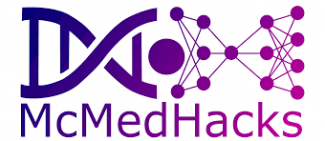July 16th at 10:00-11:30 AM EDT
Speaker: André Diamant, PhD
Academia to industry and the role AI has played in both
I will talk about my journey transitioning from academia into industry and the role AI has played in both chapters of my career. I’ll give my candid perspective on the challenges of translating AI into practice & some of the ways to overcome these challenges.
Speaker: Martin Vallières, PhD
MEDomics: integrative data modelling in oncology
Most of the content of Electronic Health Records (EHR) of our hospitals are recorded via sparse data tables with a high probability that some variables or values are missing. The EHR nonetheless possesses a vast amount of heterogeneous data from different sources, most of which are often sub-optimally exploited to characterize and predict disease behavior. For example, medical imaging (e.g. magnetic resonance imaging: MRI) would carry an immense source of potential data for decoding cancer phenotypes. On the other hand, physicians also describe and write important patient characteristics and symptoms related to the disease for almost every medical encounter via free-form medical text notes. In recent years, significant progress in multi-omics technology (e.g. genomics, transcriptomics, etc.) has also created unprecedented opportunities for characterizing the biological processes correlated with diseases. However, combining these heterogeneous data sources in a meaningful way for disease prediction is a challenge. Integrating these analysis methods within the same computing platform is also desirable. In this presentation, I will elaborate on the efforts made over the past few years by an international consortium for the development of such a platform: MEDomicsLab.
Speaker: Professor Chris McIntosh
A Machine Learning Radiation Therapy System from Bench to Bedside
We describe an AI model that generates radiation treatment plans for prostate cancer patients. AI was successfully deployed in a standard-of-care clinical setting, providing gains in efficiency, improved treatment quality, and an understanding of physicians’ decision-making and perceptions of AI use when patient care is at stake.
Workshop
July 18th at 10:00-11:30 AM EDT
Instructor: Yiping Wang
An Introduction to GAN in Medical Imaging
Generative Adversarial Network has been one of the most versatile algorithms in use today. In this presentation, we will introduce the background and intuition of GAN in general and its value and applications in the medical imaging domain. We will walk through, in both theory and implementation level, a novel GAN architecture that generates synthetic brain MRI! published in MICCAI conference!


